Qatar's tax regime is progressively maturing with the introduction of new executive regulations, including the recent one relating to withholding tax (WHT), according to PricewaterhouseCoopers (PwC), a global assurance, advisory and tax services company.
PwC Qatar tax leader Sajid Khan said with the expected introduction of the new tax administration system 'Dhareeba', there will be a "significant" focus on how the tax payers manage their compliance, which would require them to look at their internal capabilities to meet these obligations.
"We are seeing Qatar’s progression along the tax maturity curve that it started to move forward with issuing these regulations," he told the recently concluded annual tax seminar, which was attended by more than 150 executives from Qatar's leading local and multinational companies, as well as government organisations.
Discussions centred on some of the latest changes, including amongst other key changes are those to the new executive regulations to the Law No 24 of 2018 issued on December 11, 2019, which are expected to transform the tax landscape in Qatar.
Khan said the new executive regulations have brought significant changes to a number of areas of tax law including the scope of WHT, reporting and compliance obligations, changes in terms of some of the entities that are established in Qatar subsidiaries and joint ventures of listed companies as well as how to establish the Qatari nationals ownership.
"We also see specified sanctions and penalties for non-compliance like contracts to be notified on a regular basis and the scope of WHT to be increased, so it looks like Qatar is trying to balance the need between a compliant jurisdiction and a while keeping the current tax rate at the same level which is pretty low compared to international standards," he said.
In general, the scope of the current taxes has been broadened, which means there will be more transactions and companies within the tax net.
This is partly due to Qatar signing up for the Organisation for the Economic Cooperation and Development G20 sponsored BEPS framework and there are certain obligations arising from being a member of those international tax conventions that it needs to be put into its domestic legislation and we see some aspects in executive regulations.
Finding that Qatar has signed the Multilateral Framework (MLI) in December 2019 and as a result, the MLI position and the amendments to its tax treaties will enter into force in 2020; he said, "we strongly recommend that companies that are currently benefiting from a tax treaty to assess the impact of the MLI on the access to treaty benefits."
PwC tax experts also shed light on the increasing focus on transfer pricing across the globe and with the recently published executive regulations in this regard. As a result, transfer pricing is likely to be an area of substantial focus of the business community as well as the tax authorities in Qatar, as evident from as survey that found 62% of the respondents had already undertaken a transfer pricing assessment of their operations in Qatar.
"We are seeing Qatar’s progression along the tax maturity curve that it started to move forward with issuing these regulations," he told the recently concluded annual tax seminar, which was attended by more than 150 executives from Qatar's leading local and multinational companies, as well as government organisations.
Discussions centred on some of the latest changes, including amongst other key changes are those to the new executive regulations to the Law No 24 of 2018 issued on December 11, 2019, which are expected to transform the tax landscape in Qatar.
Khan said the new executive regulations have brought significant changes to a number of areas of tax law including the scope of WHT, reporting and compliance obligations, changes in terms of some of the entities that are established in Qatar subsidiaries and joint ventures of listed companies as well as how to establish the Qatari nationals ownership.
"We also see specified sanctions and penalties for non-compliance like contracts to be notified on a regular basis and the scope of WHT to be increased, so it looks like Qatar is trying to balance the need between a compliant jurisdiction and a while keeping the current tax rate at the same level which is pretty low compared to international standards," he said.
In general, the scope of the current taxes has been broadened, which means there will be more transactions and companies within the tax net.
This is partly due to Qatar signing up for the Organisation for the Economic Cooperation and Development G20 sponsored BEPS framework and there are certain obligations arising from being a member of those international tax conventions that it needs to be put into its domestic legislation and we see some aspects in executive regulations.
Finding that Qatar has signed the Multilateral Framework (MLI) in December 2019 and as a result, the MLI position and the amendments to its tax treaties will enter into force in 2020; he said, "we strongly recommend that companies that are currently benefiting from a tax treaty to assess the impact of the MLI on the access to treaty benefits."
PwC tax experts also shed light on the increasing focus on transfer pricing across the globe and with the recently published executive regulations in this regard. As a result, transfer pricing is likely to be an area of substantial focus of the business community as well as the tax authorities in Qatar, as evident from as survey that found 62% of the respondents had already undertaken a transfer pricing assessment of their operations in Qatar.

